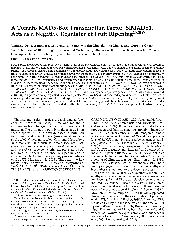摘要
MADS-box genes encode a highly conserved gene family of transcriptional factors that regulate numerous developmental processes in plants. In this study, a tomato (Solanum lycopersicum) MADS-box gene, SlMADS1, was cloned and its tissue-specific expression profile was analyzed. The real-time polymerase chain reaction results showed that SlMADS1 was highly expressed in sepals and fruits; its expression level was increased with the development of sepals, while the transcript of SlMADS1 decreased significantly in accordance with fruit ripening. To further explore the function of SlMADS1, an RNA interference (RNAi) expression vector targeting SlMADS1 was constructed and transformed into tomato plants. Shorter ripening time of fruit was observed in SlMADS1-silenced tomatoes. The accumulation of carotenoid and the expression of PHYTOENE SYNTHETASE1 were enhanced in RNAi fruits. Besides, ethylene biosynthetic genes, including 1-AMINOCYCLOPROPANE-1-CARBOXYLATE SYNTHASE1A, 1-AMINOCYCLOPROPANE-1-CARBOXYLATE SYNTHASE6, 1-AMINOCYCLOPROPANE-1-CARBOXYLATE OXIDASE1, and 1-AMINOCYCLOPROPANE-1-CARBOXYLATE OXIDASE3, and the ethylene-responsive genes E4 and E8, which were involved in fruit ripening, were also up-regulated in silenced plants. SlMADS1 RNAi fruits showed approximately 2- to 4-fold increases in ethylene production compared with the wild type. Furthermore, SlMADS1-silenced seedlings displayed shorter hypocotyls and were more sensitive to 1-aminocyclopropane-1-carboxylate than the wild type. Additionally, a yeast two-hybrid assay revealed a clear interaction between SlMADS1 and SlMADS-RIN. These results suggest that SlMADS1 plays an important role in fruit ripening as a repressive modulator.
- 出版日期2013-10
- 单位重庆大学
